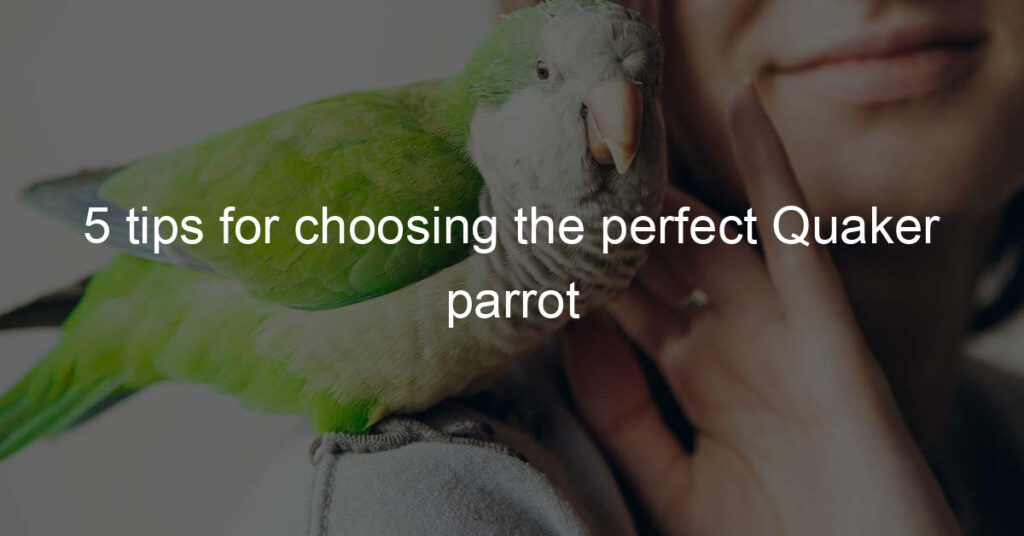Parrots are intelligent, colorful birds that make amazing pets. But with so many different species of parrots to choose from, how do you know which one is right for you?
If you’re looking for a parrot that is affectionate and easy to train, then the Quaker parrot is a great choice. Here are five tips to help you choose the perfect Quaker parrot for your home.
- Do your research – Quaker parrots are intelligent, social birds that require a lot of attention. Make sure you’re prepared to provide the time and care they need.
- Choose the right size cage – Quaker parrots need plenty of space to move around and exercise, so choose a cage that’s large enough for them to stretch their wings.
- Consider your climate – Quaker parrots come from warm climates and do best in temperatures between 65-85 degrees Fahrenheit. If you live in a colder climate, make sure you have a heated birdcage or aviary.
- Pick the right food – Quaker parrots need a diet high in protein, so look for bird food that contains at least 20% protein. You can also supplement your diet with fresh fruits and vegetables.
- Get to know your Quaker parrot – spend time bonding with your new feathered friend by talking to them, playing with them, and offering them treats.
How do you pick a good parrot?
Picking a good parrot can be tricky, but it pays to do your research when choosing one. You should read up on the different breeds of parrots and consider the characteristics of each to find out which type best suits your lifestyle.
Once you’ve figured out the breed, you want to look for specific signs that your chosen bird is healthy and well cared for.
A bright coat of feathers, alert eyes, and mannerisms that are appropriate for its age are all good indicators that you have chosen a happy and healthy specimen.
Lastly, make sure to pay attention to the bird’s temperament and how it interacts with you before making your final decision. As long as you take these steps into account when picking a parrot, you should end up with a feathered friend that will bring happiness into your life!
What do I need to know before getting a Quaker parrot?
A Quaker parrot can make a wonderful addition to your home and life, but it is important to do your research before taking the plunge into parrot ownership.
Quakers are intelligent birds that require a lot of interaction and stimulation, so you’ll want to make sure you have enough free time to devote to your new feathered friend.
Additionally, they can live a long time – up to 40 or 50 years – so be prepared for a lifetime commitment.
It’s also important to get familiar with their dietary needs as well as their specific care requirements; these birds do best in an environment that meets all of their nutritional, emotional, and physical needs.
Finally, read how to properly train and interact with your Quaker parrot to ensure your relationship starts on the right foot!
What are some fun facts about Quaker parrots?
Quaker parrots, also known as Monk Parakeets, are cheeky and intelligent birds with fascinating facts.
For starters, they are the only species of parrot that builds its own nest out of twigs and sticks! Some even build these intricate nests on the sides of buildings or telephone poles — a testament to their resourcefulness.
In terms of size, they are usually around 10 inches long, and what’s more, is that they can live up to 25 years in captivity if given proper care.
On top of that, they enjoy being social animals which means they love spending time playing with and interacting with their owners as well as other parrots. Truly, Quaker parrots are amazing creatures!
What is a good first parrot?
If you’re looking for an intelligent and friendly pet bird, a parrot could be your perfect match! Parrots are highly social birds, so they do best in households where owners spend significant time interacting with their pets.
As a general rule, larger breeds such as Macaws or Cockatoos make great choices for first-time bird owners.
Of course, size isn’t the only factor to consider when selecting your new feathered friend – different species have varying levels of intelligence and different personalities so it’s important to research before making a decision.
For example, African Grey parrots tend to form strong emotional bonds and become loving members of their family while smaller Conures are known for being mischievous and active.
Whichever breed you choose, taking good care of your feathered friend is key. Along with providing lots of love and attention, give them plenty of healthy food, comfortable perches, and a stimulating environment to keep them entertained.
The Bottom Line
Choosing the right Quaker parrot for you can seem like a daunting task.
However, as long as you keep in mind the five tips discussed in this blog post – characterizing their personality, researching their diet, considering their positioning around other animals, viewing them in person before purchase, and inquiring about proper veterinary care – you’ll be sure to find that perfect feathered friend.
Whether they become your faithful pickpocket accomplice or simply an endlessly talkative companion to make you laugh, your Quaker parrot will be one of the most lovable and rewarding pet investments that you could ever make.








